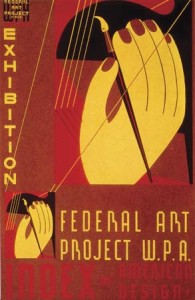 As reported earlier on Art Scatter and elsewhere, the U.S. Senate pulled a nasty Friday surprise by voting 73-24 in favor of an amendment to the national economic stimulus package that would ban any spending on a wide variety of arts and cultural projects — anything that would give federal reaction to the economic crisis the faintest whiff of a broad-based WPA solution.
As reported earlier on Art Scatter and elsewhere, the U.S. Senate pulled a nasty Friday surprise by voting 73-24 in favor of an amendment to the national economic stimulus package that would ban any spending on a wide variety of arts and cultural projects — anything that would give federal reaction to the economic crisis the faintest whiff of a broad-based WPA solution.
For Oregonians, the biggest part of the surprise was that both of our senators, Ron Wyden and Jeff Merkley, voted with the majority in favor of Oklahoma Republican Tom Coburn’s monkey-wrench amendment.
Why? I haven’t talked with Wyden or Merkley, and I haven’t seen either explain his vote. But I think fellow Scatterer Barry Johnson is right. This was a vote about the numbers — the Democrats needed to swing three moderate Republican votes to reach the required 60 to pass the stimulus bill, and the moderate Republicans could afford to break party rank on the overall bill only by mollifying conservative Republicans on the details.
Surely there’s no love lost between Oregon’s senators and the Coburn gang, especially after Coburn’s one-man holdup last year of the Mount Hood wilderness bill that Wyden had spent several years helping to prepare. And Merkley, as the new kid on the block, is going to have to line up with party leadership on a vote like this. So, giving Wyden and Merkley the benefit of the doubt, we’ll just point out that part of politics is knowing when to lose a battle so you can win a war.
But another, equally important, part of politics is for voters to remind their representatives vociferously that they don’t accept the deal-making, and to push for what’s right regardless of political maneuvering. That’s why it’s urgent that Wyden and Merkley get this message. Otherwise, in the rush of business, they might not stop to clean up the mess they helped make. And this IS a mess. It’s punitive, wrong-headed, bullying, the kind of “populism” that isn’t in the people’s interest at all but instead makes political capital by demonizing anything that smacks of intellectualism.
Our friends at Culture Shock have been following this issue, too, and I urge you to check out their take on it all. They include the most important information: How to contact your senators and let them know that you want the cultural economy to be a part of any economic stimulus plan. You can contact Wyden, Merkley, and any other senator through a format set up by Americans for the Arts.
Here’s a portion of the Culture Shock post, complete with a link to the Americans for the Arts messaging site:
Arts advocates need to quickly contact Senators Wyden and Merkley and express our extreme disappointment in them for voting for the Coburn Amendment. We need these Senators to know that their vote would detrimentally impact nonprofit arts organizations and the jobs they support in their state. Americans for the Arts has crafted a customized message that can be sent automatically to the appropriate Senator simply by entering your zip code. (For our friends from out of state, the system will recognize if your Senator voted against the Coburn Amendment and will send them a thank you letter instead.)
As Nobel Prize-winning economist Paul Krugman has repeatedly pointed out, this is no time for silly political games. The world economy faces its biggest crisis since the Great Depression of the 1930s, and ordinary rules of engagement — the automatic-pilot tinkering with the free-market controls — isn’t going to work.
This crisis calls for a massive creative response, and although the times and details are different, the New Deal and its broad-vision Works Progress Administration provide a good model to work from. So far the response has been mostly “boys-club”: build roads, shore up the banks, get Wall Street back on its feet, throw a lifeline to crumblng industries. All necessary, even if the precise approach is open to argument. But equally important are the “girls-club” issues, the sustenance of the nation’s creative capital: its schools, its health system, its cultural and historical institutions, its environmental and conservation stewardship, all of which nourish the new ideas that help drive the larger economy in addition to providing millions of necessary jobs on their own.
If not now, when? If not us, who? If not Wyden and Merkley, why?